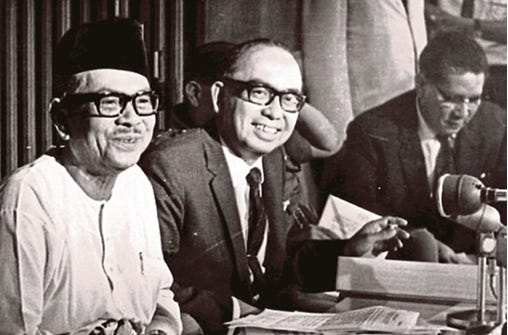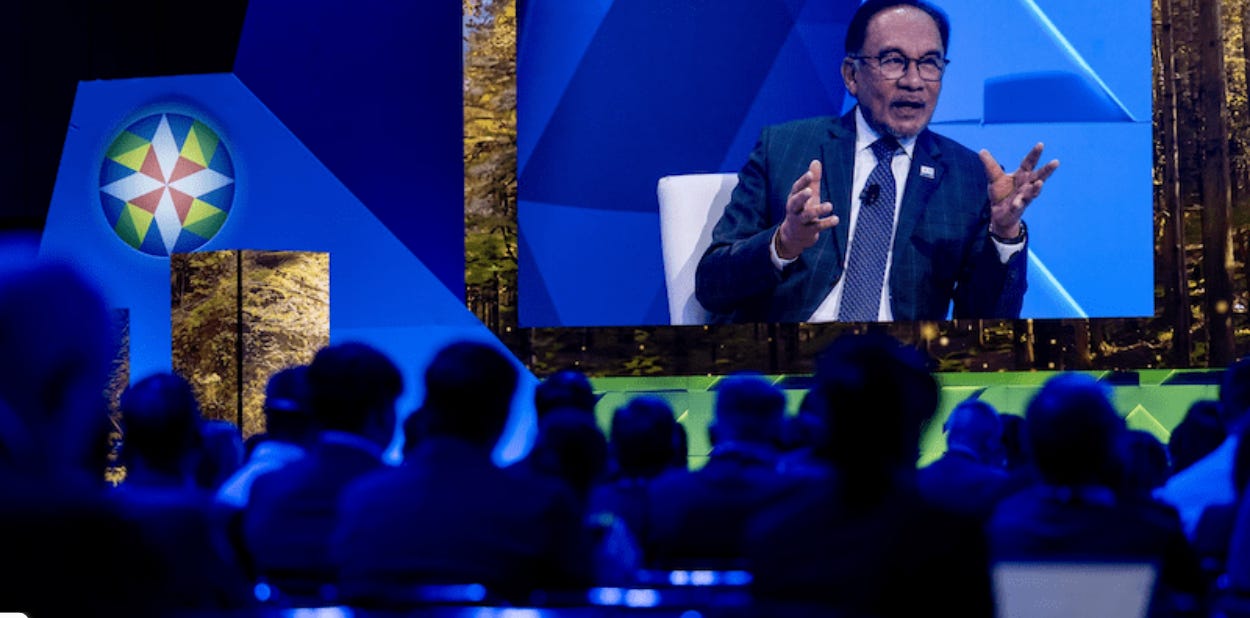Rethinking the NEP: The role of non-Malay political elites in Malaysia’s socio-economic divide
P Ramasamy
Malaysia's 2nd Prime Minister Abdul Razak Hussein, sat here by his predecessor, Tunku Abdul Rahman, formulated the NEP
Source: The New Straits Times, 16 September 2018
The New Economic Policy (NEP), introduced in the aftermath of the May 1969 racial riots, was initially conceived as a socio-economic restructuring policy aimed at addressing the economic disparity faced by the Malay community.
In its original form, the policy was not necessarily offensive to non-Malays, as it sought to foster national unity by alleviating economic imbalances.
However, over time, the NEP was transformed into an instrument of racial hegemony, disproportionately benefiting the Malay political and bureaucratic elite while failing to uplift the broader Malaysian society, including the underprivileged among both Malays and non-Malays.
Much of the critique of the NEP has been framed in racial terms, with blame directed at the Malay elite—particularly within UMNO—for hijacking the policy to consolidate power and wealth.
However, less attention has been given to the role of the non-Malay political elite, particularly the Malaysian Chinese Association (MCA) and the Malaysian Indian Congress (MIC), in enabling the excesses of the NEP.
While UMNO bears primary responsibility for the policy’s racialized implementation, the complicity of MCA and MIC in failing to challenge its more exclusionary aspects cannot be ignored.
The MCA, driven largely by the interests of the Chinese capitalist class, and the MIC, preoccupied with establishing political legitimacy among the working-class Indian community, failed to mount an effective opposition to UMNO’s increasingly racialized policies.
Their silence and inaction allowed the NEP to evolve into a tool of systemic discrimination rather than an equitable mechanism for national development.
UMNO is NOT your friend
Had these parties actively resisted UMNO’s hegemonic control and demanded a more balanced and inclusive approach, the NEP could have been implemented in a manner that truly addressed socio-economic grievances across all communities.
This failure of non-Malay political representation is not unique to the NEP era.
Even today, the Democratic Action Party (DAP), which claims to champion non-Malay interests, appears to be following a similar path—prioritizing political survival and rewards over effective resistance against exclusionary policies.
The introduction and evolution of policies like the NEP are the result of political negotiations between parties with competing interests.
The key question remains: Why did MCA and MIC remain passive in the face of policies that marginalized their constituencies?
While UMNO deserves blame for the NEP’s racially divisive impact, its implementation was not unilateral—it had the tacit approval of MCA and MIC. Understanding this dynamic is crucial in reassessing Malaysia’s political landscape and ensuring that future policies are more inclusive and equitable.
The enduring grip of NEP: Reform or political instability?
The New Economic Policy (NEP), introduced in the aftermath of the 1969 racial riots, remains one of the most contentious issues in Malaysian politics.
Initially intended to uplift the socioeconomic standing of the Malays and Bumiputras, the policy has, over time, evolved into a system that institutionalizes racial discrimination, particularly in education and economic opportunities for non-Malays.
Recently, former Health Minister Khairy Jamaluddin reignited this debate by acknowledging the frustration of non-Malays over the NEP’s discriminatory aspects, particularly in education.
While he stopped short of calling for its abolition, he suggested that addressing the grievances of non-Malays, especially in university admissions, is necessary for national unity.
However, his proposition is both politically fraught and inherently contradictory.
The fundamental problem with Khairy’s argument is that it assumes the NEP’s pro-Bumiputra framework can be retained while selectively removing its discriminatory impact on non-Malays. This is an oversimplification.
The very essence of the NEP lies in its race-based preferential treatment, and any attempt to dilute its discriminatory features would ultimately weaken the policy itself.
Moreover, who in the current political landscape has the will to challenge the NEP?
Successive governments—including the so-called reformist Madani government under Prime Minister Anwar Ibrahim—have avoided even hinting at reforming the policy.
Despite Anwar’s rhetoric on pluralism and diversity, he understands that any attempt to amend the NEP, particularly its educational quotas, could be politically disastrous.
The NEP is deeply intertwined with the government’s survival, anchored in Malaysia’s race-and-religion-based political structure.
Even past leaders who once championed the NEP, such as Dr. Mahathir Mohamad, have later spoken of its eventual removal.
Yet, having aggressively enforced the policy during his tenure, Mahathir’s credibility on this issue remains dubious.
While the NEP may have been justified in the 1970s as a corrective measure for historical economic disparities, its continued existence in its current form has turned it into a tool of racial exclusion rather than socioeconomic upliftment.
The policy’s real effectiveness in assisting Bumiputras also warrants scrutiny. After more than five decades, has it truly elevated the economic standing of the majority of Malays, or has it merely enriched a privileged elite?
The reality is that reforming the NEP is not just a matter of policy adjustments—it is a question of political survival. No government, including the current one, appears willing to take the risk of dismantling or even softening its racialized framework.
The NEP remains, for now, an untouchable pillar of Malaysian politics, ensuring that the grievances of the non-Malays persist, unresolved and unaddressed.
It is more appropriate to speak of the NEP as the Never Ending Policy of Malaysia.
Politicians Come And Go, But The Elite Are Permanent In Malaysia: Too Powerful To Overcome
https://www.eurasiareview.com/21032024-politicians-come-and-go-but-the-elite-are-permanent-in-malaysia-too-powerful-to-overcome-analysis/#google_vignette
P. Ramasamy
Former professor of political economy at Universiti Kebangsaan Malaysia (UKM) and former deputy chief minister of Penang.
Subscribe Below:





